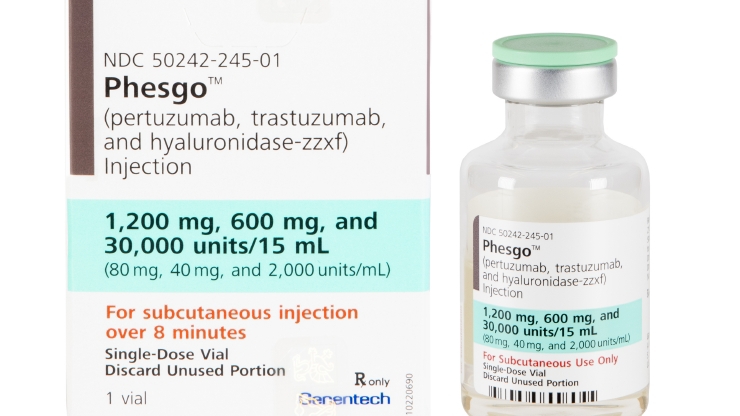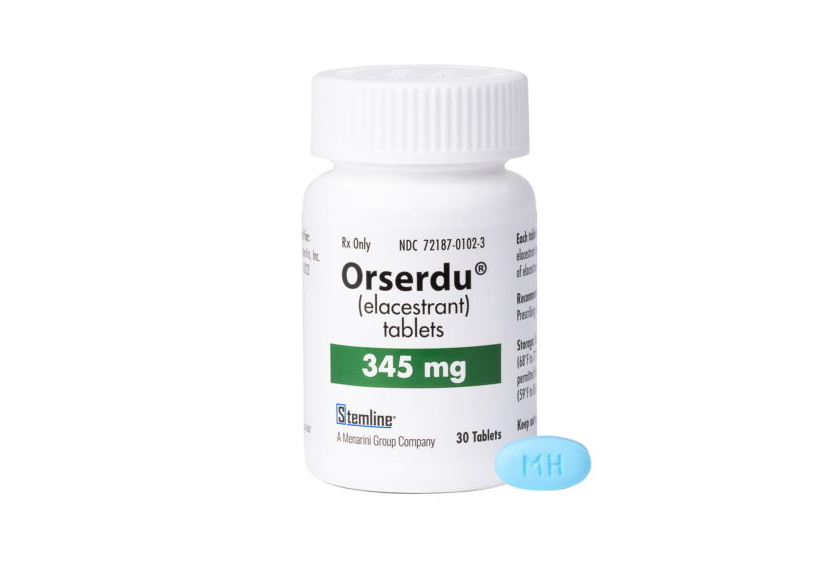Phesgo (pertuzumab, trastuzumab, and hyaluronidase) vs Orserdu (elacestrant)
Phesgo (pertuzumab, trastuzumab, and hyaluronidase) vs Orserdu (elacestrant)
Phesgo is a combination medication containing pertuzumab, trastuzumab, and hyaluronidase, used primarily for the treatment of HER2-positive breast cancer, and is administered subcutaneously. Orserdu (elacestrant) is an oral selective estrogen receptor degrader (SERD) that is used for the treatment of estrogen receptor (ER)-positive, HER2-negative advanced or metastatic breast cancer, particularly in cases where the cancer has progressed after endocrine therapy. When deciding between Phesgo and Orserdu, a patient should consider the specific subtype of breast cancer they have, as the medications target different receptors and pathways, and discuss with their oncologist the most appropriate treatment based on their individual cancer characteristics and treatment history.
Difference between Phesgo and Orserdu
| Metric | Phesgo (pertuzumab, trastuzumab, and hyaluronidase) | Orserdu (elacestrant) |
|---|---|---|
| Generic name | Pertuzumab, Trastuzumab, and Hyaluronidase-zzxf | Elacestrant |
| Indications | HER2-positive breast cancer | Advanced or metastatic ER+/HER2- breast cancer |
| Mechanism of action | HER2 inhibitors and enzyme facilitating subcutaneous administration | Estrogen receptor antagonist |
| Brand names | Phesgo | Orserdu |
| Administrative route | Subcutaneous injection | Oral |
| Side effects | Hair loss, nausea, diarrhea, anemia, etc. | Nausea, vomiting, fatigue, increased liver enzymes, etc. |
| Contraindications | Known hypersensitivity to active substances or excipients | Not established; use caution in patients with known hypersensitivity to the drug or its excipients |
| Drug class | Antineoplastic agents | Selective estrogen receptor degrader (SERD) |
| Manufacturer | Genentech, Inc. | Radiant Pharmaceuticals |
Efficacy
Efficacy of Phesgo in Breast Cancer Treatment
Phesgo is a combination therapy that includes pertuzumab, trastuzumab, and hyaluronidase-zzxf, and has been approved for use in treating certain types of breast cancer. Specifically, it has shown efficacy in patients with HER2-positive breast cancer, which is characterized by an overexpression of the human epidermal growth factor receptor 2 (HER2). Clinical trials have demonstrated that the combination of pertuzumab and trastuzumab, when given with chemotherapy, can significantly prolong progression-free survival and overall survival in patients with metastatic HER2-positive breast cancer. Phesgo is also used in the early breast cancer setting, where it has been shown to improve the pathological complete response rate when used as part of a neoadjuvant treatment regimen.
The efficacy of Phesgo is attributed to the mechanisms of action of pertuzumab and trastuzumab, which work synergistically to inhibit the proliferation of HER2-positive cancer cells. Pertuzumab binds to a different domain of the HER2 receptor than trastuzumab, resulting in a more comprehensive blockade of HER signaling pathways. This dual HER2 blockade has been a significant advancement in the treatment of HER2-positive breast cancer, leading to improved outcomes for patients.
Efficacy of Orserdu in Breast Cancer Treatment
Orserdu (elacestrant) is an oral selective estrogen receptor degrader (SERD) that has shown promise in the treatment of estrogen receptor-positive (ER+), HER2-negative advanced or metastatic breast cancer. It is particularly aimed at patients who have received prior endocrine therapy. In clinical studies, Orserdu has demonstrated efficacy in reducing the risk of disease progression and death in this patient population. The drug works by binding to the estrogen receptor, degrading it, and thereby inhibiting the receptor's interaction with estrogen, which is a key driver of tumor growth in ER+ breast cancers.
Orserdu's efficacy has been highlighted in clinical trials where it has been compared to standard endocrine therapies, such as aromatase inhibitors or fulvestrant. The results have shown a statistically significant improvement in progression-free survival for patients treated with Orserdu. This indicates that Orserdu could provide a new treatment option for patients with ER+, HER2- advanced or metastatic breast cancer who have progressed on previous endocrine therapies. Ongoing studies continue to evaluate the long-term benefits and potential for Orserdu to be used in various treatment settings within breast cancer care.
Regulatory Agency Approvals
Phesgo
-
European Medical Agency (EMA), European Union

-
Food and Drug Administration (FDA), USA

Orserdu
-
Food and Drug Administration (FDA), USA

Access Phesgo or Orserdu today
If Phesgo or Orserdu are not approved or available in your country (e.g. due to supply issues), you can access them via Everyone.org.
How it works

Make an enquiry
Choose the medicine you want to buy, answer a couple of questions, and upload your prescription to speed things up. We’ll get back to you within 24 hours.


Make an enquiry
Choose the medicine you want to buy, answer a couple of questions, and upload your prescription to speed things up. We’ll get back to you within 24 hours.


Breeze through the paperwork
We'll guide you through the required documents for importing unapproved medicine, ensuring you have all the necessary information.


Get a personalized quote
We’ll prepare a quote for you, including medicine costs and any shipping, administrative, or import fees that may apply.


Receive your medicine
Accept the quote and we’ll handle the rest - sourcing and safely delivering your medicine.

Some text on this page has been automatically generated. Speak to your physician before you start a new treatment or medication.
Let's talk
If you have any questions, call us or send us a message through WhatsApp or email:
Contact us




